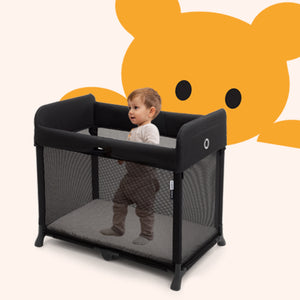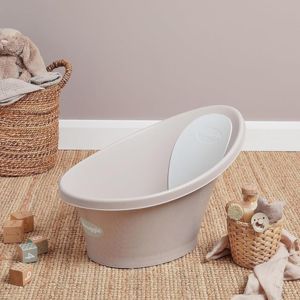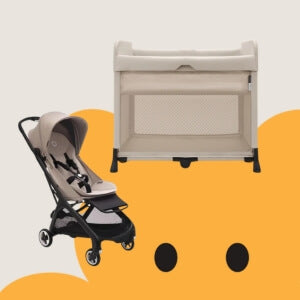A good night's sleep is vital for your little one's growth and development. It helps their physical and mental well-being and can even improve their daily behaviour and concentration, which we all know is a huge win as a new parent. Making sure your little one has a regular sleep routine and a comfortable sleeping environment is one of the most challenging tasks when you are battling sleep deprivation yourself. However, we have pulled together the Ultimate Guide to ensure your little one gets the rest they need.
Why is good sleep so important for your newborn?
Good sleep is crucial for your newborn's development, as it helps with growth, brain development, and overall health. Lack of sleep can sometimes lead to irritability, difficulty feeding, and delayed development. Make sure your little one has a comfortable sleep environment and establish a regular sleep routine to ensure they get the rest they need. Your Bub will be a happy camper, and so will you.
How many hours of sleep should a newborn get?
Newborns typically require 14-17 hours of sleep daily, with frequent naps throughout the day … we know, us sleep-deprived parents over here are jealous too! The amount of sleep they need will decrease as they grow, but it's important to continue establishing a regular sleep routine. Always consult your paediatrician if you have concerns about your baby's sleep patterns.
A helpful routine to follow when putting your little one to sleep.
Putting your little one to sleep can be challenging, but having a consistent routine can make a big difference. Here are some of our top tips to help establish a sleep routine for your Bub:
1. Create a comfortable sleep environment
Ensure that the room is dark, quiet, and at a comfortable temperature. Use a white or pink noise machine if necessary. A room temperature between 18-20 degrees Celsius is optimal for babies. It's also crucial to ensure that your baby wears comfortable and appropriate clothing for room temperature. Please see our guide to all things TOG here to help you figure out what TOG Rating is perfect for your little one’s sleep routine & environment.
2. Establish a bedtime routine
Bath time, reading a story, and singing a lullaby are great ways to signal your baby that it's time for sleep. A consistent bedtime routine helps your baby understand that it's time to wind down and get ready for sleep.
3. Make sure your baby is well-fed and changed before bedtime
As you prepare your little one for a restful night's sleep, remember to make sure they are well-fed and changed. It is recommended to feed your little one 30 minutes to an hour before bedtime, allowing them time to digest and settle down. This can help prevent discomfort or night waking due to hunger. When it comes to changing nappies before bed time you want to make sure that you have easy access to your change station & that the following essentials are readily available. This includes clean nappies, wipes, and creams or ointments to keep our little ones comfortable and dry.
4. Put your baby to bed drowsy but awake
This helps them learn how to fall asleep on their own. It's important to help your baby learn the difference between being awake and asleep, so they can start to self-soothe and sleep.
Here are some tips on how to notice when your Bub is close to sleep:
-
Look for signs of drowsiness, such as rubbing their eyes, yawning, or becoming fussy.
-
Pay attention to their breathing. Your little one's breathing may become slower and more regular when they are close to falling asleep.
-
Watch for their relaxed muscles. When your Bub starts to feel sleepy, their body will begin to relax.
-
Monitor their activity level. If your Bub is close to sleeping, their movements will slow down, and they'll become less active.
-
Pay attention to their eyes. Your Bub's eyes will start to droop and become heavy when they're getting ready to fall asleep.
5. Be consistent
Consistency is key when it comes to putting your Bub to bed. To achieve consistency, establish a bedtime routine that works for you and your baby and stick to it every night. You might need a (quiet) reminder on your phone for the same time every night, or alternatively you could get your family members to help you remember by telling them Bub’s bedtime and getting them to send you a friendly reminder. We all know how easy it is to forget things when you’re adjusting to new parenthood so we encourage you to use all the help that is being offered. By being consistent and positive, you'll help your baby develop healthy sleep habits that will benefit them for years to come.
6. Be patient
We know how frustrating it can be when you do everything these trusty expert-guides tell you to do, but nothing works. We promise it will get better, your baby may take a little while to get used to a new sleep routine, so we encourage you to stick with it & try to be patient with your little one (as hard as it can be to not throw the towel in sometimes). It can take some time for your baby to adjust to a new sleep routine, so be prepared to give it time.
7. Be flexible
It's important to be flexible when putting your baby to bed. Every child is unique and may have different sleep patterns or preferences. One approach that works for one child may not work for another. By being open-minded and willing to try different methods, you can find what works best for your baby. This can include adjusting the timing of their bedtime, using different sleep aids, or changing the environment in which they sleep. Being flexible and responsive to your baby's needs can lead to more restful nights for both you and your little one.
8. Consult with your paediatrician
If you have concerns about your baby's sleep or believe they are not getting enough of it, contact your paediatrician for advice. It's always a good idea to consult with your paediatrician if you have any concerns about your baby's sleep.
Keep an eye on your baby’s development milestones and adjust their routine accordingly, as they may have different needs at different stages. For example, when they learn to self-soothe, they may need less help from their parents to fall asleep.
Finally, it's important to remember that every baby is different and what works for one may not work for the other. Finding the best routine for your baby may take some trial and error, but with a consistent routine and a little patience, your baby will be sleeping soundly in no time.
What should my infant wear to bed?
Your infant should wear comfortable, breathable clothing to bed, such as a onesie or Swaddle. Avoid overly tight clothing or heavy blankets, as these can make your baby too warm and uncomfortable. Red Nose advises against doonas, pillows, cushions, bumpers or soft toys in the cot with babies. It's always good to check the room temperature, adjust the clothing accordingly, and aim for 18-20 degrees Celsius. Always consult your paediatrician if you have concerns about your baby's sleepwear.
What should you do if your baby is taking a daytime nap?
We have all heard the saying ‘sleep when your baby sleeps’ however, it can be easier said than done. When your baby is taking a nap, it’s a fantastic opportunity for new parents to take a bit of time for themselves, whether that means sleeping, doing a 5 minute postnatal pilates class or taking a shower. As a new parent, the responsibility lies with you to provide for your baby's seemingly endless needs. However, to be the best parent you can be, you must also look after yourself.
Here are just a few things that you can do when your Bub is taking a daytime nap:
-
Taking care of yourself can improve your mood. When you don't get enough sleep, even five minutes of reading, exercise, or meditation can make you feel like you've had a good night's sleep.
-
It’s possible to ‘catch up’ on missed sleep, so nap during the day (when you can). You can also make up for missed sleep during the week by sleeping more on the weekend when you have a few extra helping hands available to take care of your little one.
-
Make time for exercise and a nutritious diet because even a little can help. This will give you more energy.
-
After a long day, it can be challenging to relax or turn your mind off so you can sleep. Try not to worry or become irritated if you have trouble falling or staying asleep. Try telling yourself it's okay that you're warm and comfortable in bed instead, any rest is beneficial even if you aren’t sleeping. If this doesn’t work, it might be worth getting up and writing down what’s on your mind. Then you can try going through your bedtime routine again.
-
Share baby care, if possible, with your partner, family member, or friend.
-
Even if you're exhausted at the end of the day, using your energy for the most important things can make you feel better. As opposed to vacuuming, you can play with your kids, spend time with family, or hang out with friends.
You can do all of these things occasionally. However, there may be days or weeks when you feel exhausted and need to reevaluate how much you can accomplish. That's OK.
For more advice from our team of experts read more at our blog and for video reviews subscribe to our Youtube channel Baby Village TV so you don't miss a thing!
If you’d like some further assistance, we invite you to book a personalised consultation with one of our lovely nursery advisors, or leave a comment below.
BV x









































































